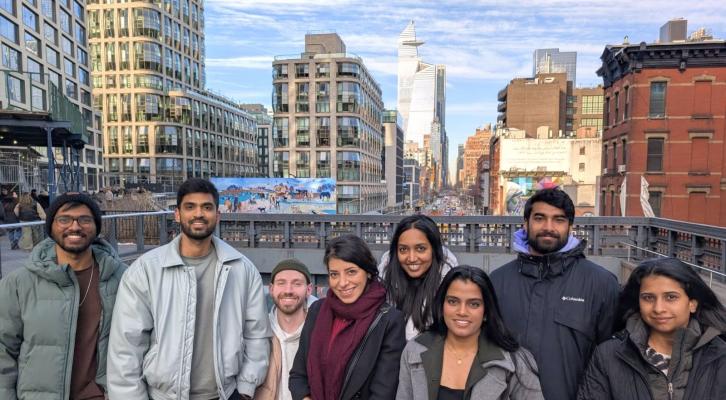Faculty

H. Andrew Schwartz is director of the Human Language Analysis Beings (HLAB) housed in the Computer Science Department at Stony Brook University (SUNY). His interdisciplinary research focuses on human-centered natural language processing for the health and social sciences. Andrew is also a PI/co-founder for the World Well-Being Project, a multi-disciplinary consortium between the University of Pennsylvania, Stony Brook University, and Stanford University focused on developing large-scale language analyses that reveal and predict differences in health, personality, and well-being. Andrew is an active member in the fields of AI-natural language processing, psychology, and health informatics. He is the creator and one of the maintainers of the Differential Language Analysis ToolKit (DLATK), used in over 100 studies and by a variety of tech organizations. He received his Ph.D. in Computer Science from the University of Central Florida in 2011 with research on acquiring common sense knowledge from the Web. He is a 2020 Recipient of a DARPA Young Faculty Award. His research often attracts public interest with articles in, e.g., The New York Times, USA Today, and The Washington Post. He enjoys his family, research, and disc golf.

Developing ways to measure, describe and differentiate psychological constructs using Natural Language Processing and Machine Learning. He is particularly interested in measuring psychological well-being including harmony in life and satisfaction with life. Recently, Oscar and HLAB members have developed an r-package called Text for analyzing text using NLP and deep learning: https://r-text.org/
PhD Students

Adi is a fifth-year PhD student. His recent and ongoing projects inform the computational social science community of effective ways to use state-of-the-art NLP tools for human-focused NLP problems. His contributions to open-source have helped this community to conduct faster research on data at scale without being limited by inexperience in programming. .

Nikita is a fifth-year Ph.D. student enthused about NLP's expanding outreach in people's lives and it's unexplored abilities to understand human nature better and more efficiently than ever. Nikita finds herself challenged in directing NLP language models to look beyond the current limitations and consider the human behind the language. The purpose of her research is to enable the growth of more empathy in an AI-future centric world, thereby augmenting humanity rather than detracting from it.
Scott Feltman
Scott Feltman is a fourth-year PhD student in Applied Mathematics and Statistics, specializing in statistical methods in computational biology working with Professor Schwartz. Currently, he is working to bridge the gap between state-of-the-art mathematical models with powerful transformers and other deep learning architectures for time-series data in the field of psychiatry. This union, in addition to the inclusion of natural language data, would allow for robust forecasting of stress levels in patients diagnosed with PTSD. When he's not working, he relaxes by playing the guitar, enjoying his passion for music.

Aaron Marker is a third-year doctoral student in computer science, conducting research in natural language processing (NLP) under the supervision of Professor Schwartz, with a particular focus on deriving computational insights into eudaimonic well-being. He has also worked on projects using predictive models to identify demographic biases. Aaron holds a BS with a double major in Computer Science and Cybersecurity from Randolph Macon College, where he also minored in math and ethics. Beyond his interest in NLP and AI, Aaron enjoys art and spends his spare time painting and sketching.

Pranav Chitale is a first-year computer science Ph.D. student at Stony Brook University. He is interested in building Large Multimodal Reasoning Models for Human-centered NLP tasks. During his Master’s, he worked with Professor Schwartz on evaluating human language models (HuLMs) to predict psychological outcomes. In his leisure time, Pranav enjoys playing the piano.
Postdocs
Research Staff

Julia Buffolino
Lab Manager
Julia Buffolino rejoined HLAB in 2025, after first working with the lab in 2021. She specializes in research coordination, interdisciplinary collaboration, and survey research. She is particularly interested in psychological well-being and mental health research and aspires to pursue a graduate program in psychology to further her research career.
juliabuff@cs.stonybrook.edu
juliabuff@cs.stonybrook.edu

Fullstack Software Engineer
Tony Bui is an NLP software engineer focused on turning language into reliable measures of emotion and behavior. He builds applications and data pipelines for mental-health and well-being research.
Tony works at the intersection of psychological science and NLP, developing language-based methods to study affect, cognition, and everyday behavior with an eye toward clarity, ethics, and real-world impact.
tonybui5503@gmail.com
Tony works at the intersection of psychological science and NLP, developing language-based methods to study affect, cognition, and everyday behavior with an eye toward clarity, ethics, and real-world impact.
tonybui5503@gmail.com
Affiliates

Assistant Professor of Psychology at UTC Dallas
Dr. Ryan L. Boyd was an Associate Research Professor and the Principal Research Scientist for the HLAB during his time at Stony Brook. He is now an Assistant Professor in the Department of Psychology, School of Behavioral and Brain Sciences, at University of Texas at Dallas. He is a psychologist and computational social scientist — his research research spans topics ranging from personal to society-level social processes, including mental health, motives, emotion, human sexual behavior, and storytelling. He has authored dozens of free, open-source text analysis applications for social scientists and is one of the lead scientists behind Linguistic Inquiry and Word Count (LIWC), the most well-validated and widely-used social science text analysis application. Dr. Boyd has served on multiple editorial boards in the fields of Psychology and AI, and his work has been featured by numerous popular media, including The New York Times, the BBC, CNN, and the Washington Post. He is also a huge fan of good coffee, pizza, and big ol' friendly dogs.

Assistant Professor in Psychology at Stanford University
Johannes is a computational social scientist in psychology, an Assistant Professor in Psychology, and the Shriram Faculty Fellow at the Institute for Human-Centered Artificial Intelligence. For the 2025/2026 academic year, he is a Visiting Assistant Professor in Decision Sciences at INSEAD in Fontainebleau, near Paris. At Stanford, he directs the Computational Psychology and Well-Being Lab. In 2011, he co-founded the World Well-Being Project at the University of Pennsylvania, which is now a big data psychology consortium.

Assistant Professor at McMaster University, Department of Computing & Software
Allie Lahnala is an interdisciplinary researcher working at the intersection of natural language processing (NLP), computational social science, and psychology. Her research focuses on modeling social, goal-oriented conversations, with a particular emphasis on empathetic interaction, persuasion, and the dynamics of conversational support. She is especially interested in developing efficient methods to integrate insights from the social sciences into robust, personalized machine learning applications. She works with various domains and contexts, such as online forums for supportive and opinionated interactions, and clinical conversations, in which she investigates stance dynamics and empathetic interactions, and transfer learning to better model social NLP tasks. She is also interested in developing theory-driven empathy research approaches for NLP that consider the complex affective and cognitive processes and social factors that influence empathetic expression and perception.

Data Scientist at the National Institute of Drug Abuse (NIDA)
Salvatore Giorgi is a data scientist working under Dr. Brenda Curtis at the National Institute on Drug Abuse (NIDA). He received his Ph.D. in Computer Science at the University of Pennsylvania working under Dr. H. Andrew Schwartz and Dr. Lyle Ungar. His research interests include machine learning applications to substance use and recovery, as well as relationships between individuals and their communities as expressed through language on social media.

Postdoctoral Researcher at CMU
Vasudha is a postdoctoral researcher at CMU’s Language Technologies Institute (since August 2025). Her research investigates how human cognition is reflected in conversations, both between people and in interactions with large language models. She develops methods for generating safe, contextually appropriate responses, with applications in mental health therapy and diagnostics that are responsive to cultural and social-pragmatic factors. She is also interested in using NLP to address questions in computational social science by analyzing socio-psychological phenomena through language at scale.
MS and BS Students
Phd, PostDoc and Research Staff Alumni

Mahsa Khoshnoodi
PhD Student, Georgetown University
Mahsa is a first-year PhD student in Computer Science at Georgetown University. Her research lies at the intersection of natural language processing, human-centered computing, and multimodal learning. She is particularly focused on understanding how reasoning emerges in language models and on developing models that integrate language with other modalities to gain deeper insights into human cognition and decision-making.

Lucie Flek is a full time professor at the University of Bonn, leading the research group on Conversational AI and Social Analytics (CAISA). Her research interests revolve around machine learning applications in Natural Language Processing (NLP), particularly in user modeling and stylistic variation. She investigates how language usage varies among individuals and sociodemographic groups, using this variation to predict in-group behavior in machine learning tasks. Her work also delves into bias in NLP, ethics issues, and performance of models on underrepresented groups. Lucie's Ph.D. focused on meaning ambiguity, incorporating expert lexical-semantic resources into DNN classification tasks. She actively collaborates across disciplines and has experience in industry projects related to limited training data scenarios. Lucie has a background in particle physics research and is passionate about cross-disciplinary collaborations.

Sid Mangalik graduated with his PhD in July 2025, afterwards he joined Meta as an ML Research Scientist. His research with Dr. H. Andrew Schwartz focused on identifying connections between community-level language and psychological outcomes. Further research he conducted with Dr. Ryan Boyd was on the self-beliefs that individuals and communities have. He also worked as a Research Scientist at Monitaur, a start-up focused on making machine learning models fairer, safer, and more transparent. His previous research was at the intersection of artificial intelligence and psychology, where he worked with Dr. Ritwik Banerjee on language use in scientific writing and among abusers. In his free time Sid writes and produces music, he released his first album in 2020.

Swanie Juhng is a Research Scientist at Meta. She earned her PhD in June 2025 from HLAB, where her work focused on natural language processing and psychology. Her research interests lie on leveraging linguistic and nonlinguistic signals to model and analyze the mental health problems, specifically anxiety and depression.

Natural language processing with particular care for areas involving time-series analysis, social media, mental well-being, and computational social science. Additionally, I have a broader interest in applied machine learning as a whole for tasks related to vision and computer networking.

The intersection of computer science and psychology: I love applying data science and natural language processing methods to analyze human thoughts, their characteristics and behaviors. Isn’t it cool to transform a person’s thought, something very abstract, into a concrete numeric vector space and then manipulate, analyze these vectors. Finally, map them back to the human’s thoughts space to predict their next behavior, or to predict their mental health state? My projects involve analyzing social media posts to understand the general public’s major beliefs on specific pre-defined topics.

Research Scientist at Ebay
Computational social science and natural language processing; Social media language analyses for psychological health and well-being; Integrating language and extra-linguistic data; social networks and graph mining

Natural Language Processing (NLP) for social media analysis. I especially focus on discourse relation parsing to extract key information for targeted tasks such as opinions and reasons for a political stance or sentiment, and finding the correlations of discourse styles with human variables such as personality. I collaborate with psychologists and computational linguists for Human-centered language modeling to obtain higher accuracies of various NLP tasks from traditional tasks (e.g., sentiment analysis) to novel tasks such as discourse style analysis for psychological assessment and well-being measurement.

Now at Facebook Research, Seattle.
My interest is primarily in natural language processing, with some overlap into data mining and artificial intelligence. In addition to computer science, I am interested in the humanities and social sciences, particularly psychology, linguistics, and classics, and am drawn to projects that are interdisciplinary in nature. My long-term goal is to pursue a career doing NLP research, hopefully both in industry and academia.
My interest is primarily in natural language processing, with some overlap into data mining and artificial intelligence. In addition to computer science, I am interested in the humanities and social sciences, particularly psychology, linguistics, and classics, and am drawn to projects that are interdisciplinary in nature. My long-term goal is to pursue a career doing NLP research, hopefully both in industry and academia.
Now a Postdoc at Stanford University. My research interests are at the intersection of natural language processing and computational social science. In particular, I am focused on making NLP models human-centric, socially aware, and cognizant of linguistic variation. I am also interested in applying NLP methods to uncover social biases through the lens of natural language.

Syeda Mahwish
Senior Research Coordinator
Syeda is the former Senior Research Coordinator at HLAB. She is now a PhD student at Cornell University in the Psychological Sciences and Human Development program, working with Jonathan Rottenberg in the Better Outcomes Lab. She earned her Master’s in Public Health with a concentration in epidemiology and biostatistics at Stony Brook School of Medicine. Within HLAB, Syeda collaborated on several projects on alcohol abuse disorder and cognitive dissonance, although her main study focused on developing a language-based measure of Resilience (ReLM). Her current research interests include understanding resilience and coping mechanisms in the face of adversity and psychopathology. sm2982@cornell.edu

Weixi Wang
weixiwang@cs.stonybrook.edu
Weixi is the former research coordinator of the HLAB. He received his BA in Sociology from the University of Texas at Austin. His research interests include stress, trauma exposure, PTSD, and related comorbidities (e.g. substance use disorder). The goal is to improve the treatment of trauma-related disorders to promote healing and empowerment among trauma survivors. He plans to pursue a Ph.D. in Clinical Psychology and a career as a researcher.
MS Alumni
Yejin Lee
Research Project: Understanding adolescent well being on Social Media

M.S. in Data Science, Stony Brook University, Fall 2024
Thesis: WhiSPA (Whisper Semantically and Psychologically Aligned). Researched representation learning frameworks and proposed multimodal alignment methods. Bridged the cross-modal gap between spoken language and written language.
Shreyashee Sinha
Research Project: Social Media Auto Regressive Transformer model
Himanshu Chaoudhary
Master's Student
Research Project: Sparkifying Transformer-based (LLM) Embeddings

Avish Parmar
Master's Student Fall 2023
Research Project: LFactor
Theodore Grossberndt
Master's Student
Speech to Text
Manal Shah
Research Project: Python application to embed large scale language data on Hadoop clusters
Gourab Dey
Master's Student
Research Project: Social Media Transformers: Socialite Lamma2

Farhan Ahmed
Farhan is a BS/MS alumni who studied computer science and applied mathematics working with Professor Andrew Schwartz. Farhan is interested in natural language processing and data science. His current research focuses on reducing selection bias from social media in making predictions for mental health and well-being.
Sumit Agarwal
Kanishta Agarwal
Research Project: Mood Forecasting: Using ARIMA to Predict Future Affect
Pooja Aravinder
Nipun Bayas
Research Project: Optimism in Social Media
Austin Borger
Mallikarjuna Budida
Research Project: BERT Feature Extraction on TPU
Swatilekha Chaudhury
Research Project: NCDS Longitudinal Essays
Pooja Dalaya
Research Project: Age and Income Weights for Sample Bias Correction
Pulkit Dongle
Research Project: DLATK: DeMySQLfying
Neelaabh Gupta
Research Project: Predicting Physical Activity using DLA
Keshav Gupta
Research Project: Sample Bias Correction
Omkar Kanade
Master's Student Fall 2023
Research Project: Improving IRT for Adaptive Language-based MH Assessment
Deepak Gupta
Research Project: LexHub Development
Emil Joswin
Research Project: Permutation Language Modeling and Data Collator for XLNet
Akash Idnani
Research Project: Latent Traits Exploration Extended Multi-Domain Single Factor
Kiranmayi Kasarapu
(MS, 2018; Now at Amazon)
Research Project: Social Mobility Prediction
Adarsh Kashyap
Research Project: Health Care Utilization
Parth Limbachiya
Research Project: Implementation of CoxPh Model
Rowan Menezes
Research Project: Brands Across Years
Sourav Mishra
Anvesh Myla
Research Project: Quantitative Evaluation of Interpretability of Latent Factors
Mihir Parulekar
Research Project: Privacy Analysis of BERT Embeddings
Sania Parveen
Research Project: BERT Feature Extraction

M.S. in Computer Science, Stony Brook University, May 2025
Thesis: A Systematic Evaluation of Transformer-LM Representations for Capturing Author States and Traits

Akshay Raghavan
Master's Thesis Fall 2024
Adarsh Prabhakara

B.S Mathematics, Stony Brook University, 2024
Thesis: Autoencoder Human Language Modeling
Aman Raj
(MS, 2017; Now at Google)
Research Project: Large-scale Social Media Assessment.
Aravind Reddy
Research Project: Adolescent Depression - Longitudinal Representations
Damayanti Sengupta
Research Project: Social Media and Mental Health
Deven Shah
(MS, 2018; Now at Yahoo Research)
Research Project: Human Bias in Predictive Models
Research Project: Human Bias in Predictive Models
Swetambari Verma
(MS, 2018; Now at Facebook)
Research Project: Assessing Income and Education from Social Media Language
Jihu Mun
(Undergraduate; investigating the reliability of distress scores of Twitter users across different spatial and temporal resolutions.)
Anthony Xiang
(MS; music and audio representation, NLP)







